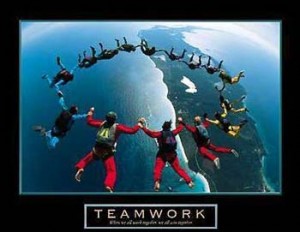 Individual talent alone won’t make a team successful. Team members must be able to understand and take advantage of each others strengths to be successful. That’s teamwork.
Individual talent alone won’t make a team successful. Team members must be able to understand and take advantage of each others strengths to be successful. That’s teamwork.
Coaches play an important role in enhancing teamwork. They set the tone for the whole team. If the coach is committed to the team, players also see the importance of being committed. In contrast, coaches who are not as committed imply that the team isn’t that important.
Coaches can encourage teamwork by treating each player equally. For example, a coach may have a team rule that if players miss practices, they don’t start a game. No matter who the player is (starter, non starter for example), follow that rule. Being consistent will maintain your credibility as a coach. When players see you as credible, they will be more likely to listen to you and follow the rules.
Here are some additional ways you can build teamwork:
1. Encourage open lines of communication between you and your young athletes–and among the athletes themselves. As part of that communication, coaches, need to be clear about team members’ responsibilities and practice and tournament expectations. Coaches need to communicate well about strategy. Team members need to be open with one another about running plays and improving on-court productivity. Athletes don’t necessarily have to be best friends, but they need to respect one another.
2. Make sure all athletes know their role on the team. Teamwork is undermined when athletes don’t know their roles. Prevent ambiguity about athletes’ roles by scheduling team meetings to discuss kids’ roles. Athletes should also talk to each other about what they need from their team mates. For example, they might discuss their need to encourage each other after making mistakes.
3. Develop a team mission. This could be your goals for the season. It could be a motto or statement to encourage team unity. You could also ask athletes to sign the team mission. When teams develop goals or a mission, athletes are more likely to be committed and take ownership of the team.
4. Work to create a team identity that feels different than other teams’ identity. Players are more likely to develop team unity if their team feels unique. To do this, encourage team rituals. Consider establishing cheers, a team mission, warm up routines or unique drills.
Many athletes participate in sports to be part of a team. Coaches can improve their athletes experience by focusing on the importance of teamwork.


























Couldnt agree more with that, very attractive article
Great post. I used to bee checking continuously this blog and
I’m inspired! Extremely helpful information specifically the remaining phase 🙂 I maintain such info much.
I wwas seeking this partticular info for a very long time.
Thanks and best of luck.
Also visit mmy weblog: Performance review Coaching
You made an interesting point when you explained that it is a good idea to make sure that all athletes know the role they play on their team. In addition to that, it might be a good idea to make sure that all members of the team feel included. It seems like providing jerseys or something similar for all members of the team will be a good way to help them feel included.